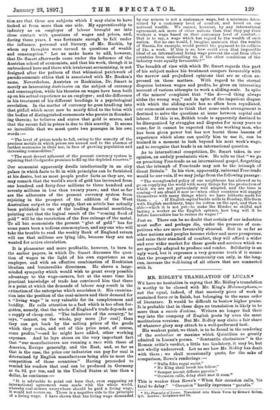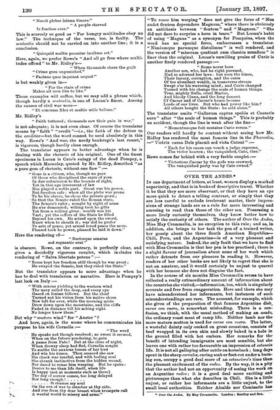MR. RIDLEY'S TRANSLATION OF LUCAN.* WE have no hesitation in
saying that Mr. Ridley's translation is worthy to be classed with Mr. King's Metamorphoses,— not the equal, indeed, of that masterly piece of work in sustained force or in finish, but belonging to the same order of literature. It would be difficult to bestow higher praise. It is probable that in these days no translation is likely to be more than a micas d'estime. Writers no longer find their way into the company of English poets by even the most meritorious versions. But Mr. Ridley may claim a fair share of whatever glory may attach to a well-performed task.
His weakest point, we think, is to be found in the rendering of the sententiae or maxims which Quintilian so greatly admired in Lucan's poems. " Sententiis clarissimus " is the Roman critic's verdict, a little too laudatory, it may be, but not wholly undeserved. Let us see bow Mr. Ridley has dealt with them ; we shall occasionally quote, for the sake of comparison, Rowe's renderings :—
" Nulls fides regni sociis."
"No King shall brook his fellow."
" Semper nocuit differre paratis."
"Occasion calls, delay shall mar it soon."
This is weaker than Rowe's "When fair occasion calls, 'tis fatal to delay." " Occasion " hardly expresses " paratis."
• The Pharsalia of Lucan. Translated into Blank Verse by Edward Ridley. Q.C. London Longmans and Co.
" Nescit plebes ieiuna timere."
"A people starved Is fearless ever."
This is scarcely so good as "For hungry multitudes obey no law." The technique of the verse, too, is faulty. The sententia should not be carried on into another line ; it is a conclusion.
" Quicquid multis peccatur inultum est."
Here, again, we prefer Rowe's "And all go free where multi- tudes offend" to Mr. Ridley's- " When thousands share the guilt "Crime goes unpunished."
" Facinus quos inquinat aequat" is but weakly given in- " For the stain of crime Makes all men like to like."
These examples will suffice, but we may add a phrase which, though hardly a Bente-raja, is one of Lucan's finest. Among the causes of civil war were-
" Et concussa fides et multis utile helium."
Mr. Ridley's "Faith tottered ; thousands saw their gain in war," is not adequate; it is not even clear. Of course the translator means by "faith" "credit "—i.e., the faith of the debtor to the creditor—but the word cannot be used absolutely in this way. Rowe's "And war, the needy bankrupt's last resort," is vigorous, though hardly close enough.
The translator appears to better advantage when he is dealing with the rhetoric of his original. One of the finest specimens in Lucan is Cato's eulogy of the dead Pompey, a speech which Macaulay, quoted by Mr. Ridley, described "as a pure gem of rhetoric, without one flaw " :—
" Gone is a citizen, who, though no peer Of those who disciplined the state of yore
In due submission to the bounds of right,
Yet in this age irreverent of law
Has played a noble part. Great was his power, But freedom safe : when all the plebs was prone
To be his slaves, he chose the private gown ;
So that the Senate ruled the Roman state,
The Senate's ruler ; nought by right of arms Ile e'er demanded; willing took he gifts
Yet from a willing giver: wealth was his
Vast ; yet the coffers of the State be filled
Beyond his own. He seized upon the sword, Knew when to sheath it ; war did he prefer To arts of peace, yet armed loved peace the more.
Pleased took he power, pleased he laid it down."
Here the rendering of- " Rectorque senatus sed regnantis erat ' is obscure. Rowe, on the contrary, is perfectly clear, and gives a decidedly vigorous couplet, which includes the rendering of " Salva libertate potens " :—
"Rome kept her freedom still though he was great ; He swayed the Senate, but they ruled the State."
But the translator appears to more advantage when he has to deal with translation or narrative. Here is Pompey's last look on Italy :—
"With canvas yielding to the western wind The navy sailed the deep, and every eye Gazed on Ionian billows. But the chief Turned not his vision from his native shore Now left for ever, while the morning mists Drew down upon the mountains, and the cliffs Faded in distance till his aching sight No longer knew them."
But why "western wind" for " Auster "?
And here, again, is the scene where he communicates his purpose to his wife Cornelia :— " The word He speaks not though resolved ; so sweet it seemed, When on the future pondering, to gain A pause from Fate! But at the close of night, When drowsy sleep had fled, Cornelia sought To soothe the anxious bosom of her lord And win his kisses. Then amazed she saw His cheek was tearful, and with boding soul She shrank instinctive from the hidden wound, Nor dared to rouse him weeping. But he spake : Dearer to me than life itself, when life Is happy (not at moments such as these) The day of sorrow comes, too long delayed Nor long enough It shames my soul On the eve of war to slumber at thy side, And rise from thy dear breast when trumpets call A woeful world to misery and arms." "To rouse him weeping" does not give the force of "Nan audet flentem deprendere Magnum," where there is obviously an antithesis between " flentem" and "Magnum." "She did not dare to surprise a hero in tears." But Lucan's habit of using "Magnus" as a synonym for Pompeitte, when the word has no special force, embarrasses a translator. " Nimiumque parumque distulimus " is well rendered, and the version of " miserum quatinnt cum classica mundum" is finer than the original. Lucan's unwilling praise of Curio is another finely rendered passage :— " Rome never bore Another son, who, had he right pursued, Had so adorned her laws : but soon the times, Their luxury, corruption, and the curse Of too abundant wealth, in transverse stream Swept o'er his wavering mind; and Curio changed Turned with his change the scale of human things.
True, mighty Sulla, cruel Marius, And bloody Cinna, and the long descent Of Caesar and of Caesar's house became Lords of our lives. But who had power like him ?
All others bought the State: he sold alone."
The translator omits " Gallorum captns spoliis et Caesar's aura" after "the scale of human things." This is probably an accident, though the line is weak after the fine- " Momentuntque fuit mutatus Curio rerum."
Our readers will hardly be content without seeing how Mr. Ridley has rendered the most famous line in the Pharsalia, —" Victrix causa Deis placuit sed victa Catoni " :— " Each for his cause can vouch a judge supreme, The victor heaven; the vanquished, Cato, thee."
Rowe comes far behind with a very feeble couplet :— " Victorious Caesar by the gods was crowned, The vanquished party was by Cato owned."



































 Previous page
Previous page